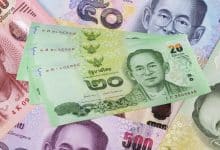Thai baht predicted to appreciate amid expected US interest rate cuts

The Thai baht is predicted to appreciate to 33 against the US dollar in the near future, as the market anticipates an early start to US Federal Reserve interest rate cuts, possibly as soon as March. This expectation could trigger an inflow of funds into the Thai currency.
The baht registered at 34.26 to 34.28 per US dollar yesterday, a slight depreciation from Tuesday’s close of 34.14, a trend that mirrors other regional currencies due to the rise in US bond yield and increased dollar demand.
According to Kanjana Chockpisansin, head of research at Kasikorn Research Centre, fluctuations in the Thai currency throughout the year will largely depend on the Fed’s rate cuts. She suggests that the baht could appreciate 33 against the greenback soon.
“The market believes the Fed will be quick to cut rates aggressively this year.”
The market anticipates that the US central bank will slash rates by up to 1.5 percentage points in 2024, reducing the rate from 5.25% to 5.5% to approximately 4% by the end of the year. However, Kasikorn Research Centre predicts a more cautious approach from the Fed, forecasting a rate cut of only 0.75 percentage points this year, Kanjana said.
“The Fed worked very hard to curb US inflation by raising and maintaining rates at a high level. We don’t think they will rush to cut the rate as the economy remains sound, while inflation remains persistently high.”
She predicts the Thai currency will adjust in response to the depreciating dollar and the Fed’s rate cuts, concluding the year at approximately 34 baht to the greenback.
Therdsak Thaveeteeratham, Executive Vice President of Asia Plus Securities, concurs with the potential appreciation of the baht to 33 to the dollar, primarily due to the anticipated US interest rate cuts starting in March.
“The baht is strengthening, which is driving fund inflows.”
On Tuesday, foreign investors were net buyers in the Stock Exchange of Thailand by 1.25 billion baht (US$ 36,283,962), reported Bangkok Post.
Therdsak also mentioned that tourism stimulus measures should boost the number of arrivals, particularly Chinese visitors, leading to a trade surplus and services surplus, thereby strengthening the baht.
Between 2015 and 2019, Thailand recorded a current account surplus of 3.68 billion baht (US$ 106,819,985), mainly from a trade and services surplus, while the baht averaged 31 to the dollar. He suggests that if tourist numbers rebound, Thailand could again register a trade and services surplus, bolstering the baht and increasing fund inflows.
Latest Thailand News
Follow The Thaiger on Google News:


























